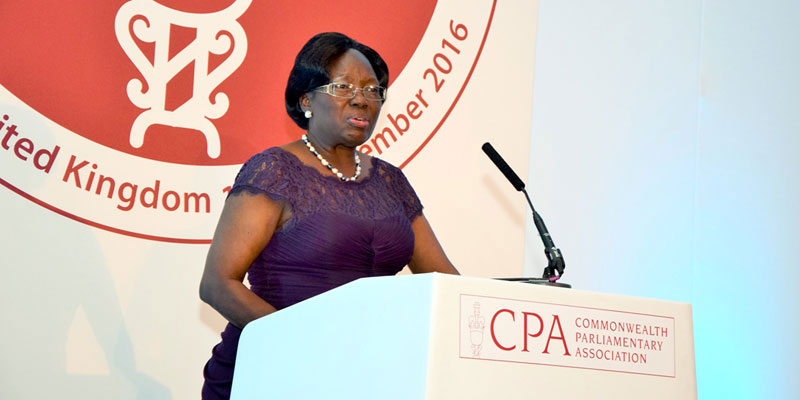Analysis
Parliament in the last 55 years of Independence
Since independence in October 1962, the Uganda Parliament has had nine speakers, only one woman; Rebecca Alitwala Kadaga. The Woman Member of Parliament (MP) for Kamuli District, the first woman Speaker has been in Parliament for the last 27 years, 16 of which as both Deputy Speaker, first, and then Speaker.
Two of those speakers have faced turmoil in their tenancy of the House: Narendra Patel, the second post-Colonial speaker and only Asian, from 1963 to 1971; and now Kadaga. Patel took over the mantle from Sir John Bowes Griffin (1962 -1963), Uganda’s first Speaker after independence. Sir Griffin had been Uganda’s Chief Justice from 1952-1958.
Patel witnessed the replacement of the 1962 Constitution with the “Pigeon-hole” constitution. That is when Prime Minister Apolo Milton Obote, defiled the sanctity of Parliament by having five ministers arrested from inside the House. It represented Obote’s falling out with Kabaka Frederick Mutesa of Buganda Kingdom.
Whereas this was unprecedented, arguably what Kadaga has witnessed this September, 2017, as the country is preparing for the 55th Independence Anniversary Celebrations, has been utter chaos in the House.
This is during the introduction of the controversial Private Member’s Age Limit Bill. Introduced by Igara West MP, Raphael Magyezi, the Bill seeks to amend the 1995 Constitution’s Article 102 (b) to remove the age limit of 75 years for a president in office.
The net effect of it is that it would allow incumbent President Yoweri Museveni, to stand as president in 2021, when he is past 75 years of age. Opposition MPs vehemently opposed the introduction of the Bill in the House leading to unprecedented brawl in the House with fist-fights and destruction of furniture.
Failing to control the MPs in the first instance of adjournment, Kadaga “called in” the Police and other security agencies to manhandle the errant MPs. In the process, ten MPs were seriously beaten by the operatives, requiring admission in hospitals. Subsequently, Kadaga suspended 25 other MPs, one of them, Ronald Kibuule, Minister of State for Water, for illegal possession of a firearm in the precincts of the House.
Patel’s speakership ended in 1971 when Colonel Idi Amin overthrew Obote in a coup. Thereafter, he abrogated Parliament and ruled by decree. After the Liberation Wae of 1979 when Amin was toppled by a combination of guerilla forces in exile and the Tanzanian People’s Defense forces (TPDF), Prof. Edward Rugumayo (1979-80), took over the mantle.
An academician, Rugumayo was nominated to chair the National Consultative Council (NCC) of the 1979 Moshi Conference in Tanzania which was adopted as the interim Parliament after following overthrow of Idi Amin, NCC continued to be the supreme legislative body until the general elections of 1980.
Francis K. Butagira (1980-1985), who had been an NCC member of and a High Court judge between 1974 and 1979, took over the speakership of the fourth Parliament until the military coup by Gen. Tito Okello, who overthrew Obote’s second Uganda People’s Congress Government.
Okello’s Government was in turn overthrown by Yoweri Museveni’ rebel forces in 1986. They instituted the National Resistance Council (NRC), which was its Parliament. As its chairman, Musevenui presided over the fifth Parliament from 1986 to 1996 when it passed the Constituent Assembly Statute that established and provided for the election of the Constituent Assembly Delegates to work on the formulation of the new constitution. The 1995 Constitution instituted yet another Parliament and James Wapakhabulo presided over the sixth Parliament from 1996 to 1998.
Wapakabulo is remembered for having strongly opposed the lifting of term limits in 2005 which led to his fall-out with President Museveni. He was replaced by Francis Ayume (1998- 2001), who continued Wapakhabulo’s sixth Parliament, when he was had to resign his speakership on being appointed Attorney General in 2001.
Edward Ssekandi became Speaker in 2001 and steered both the seventh and eighth Parliaments. He first served as Deputy Speaker under the late Wapakhabulo from 1996 to 2001, and then took over until 2011, when he was named the Vice President, the position he still occupies. He was deputized by Kadaga till she assumed the full mantle from the eighth and now the tenth Parliament.
Comments



















